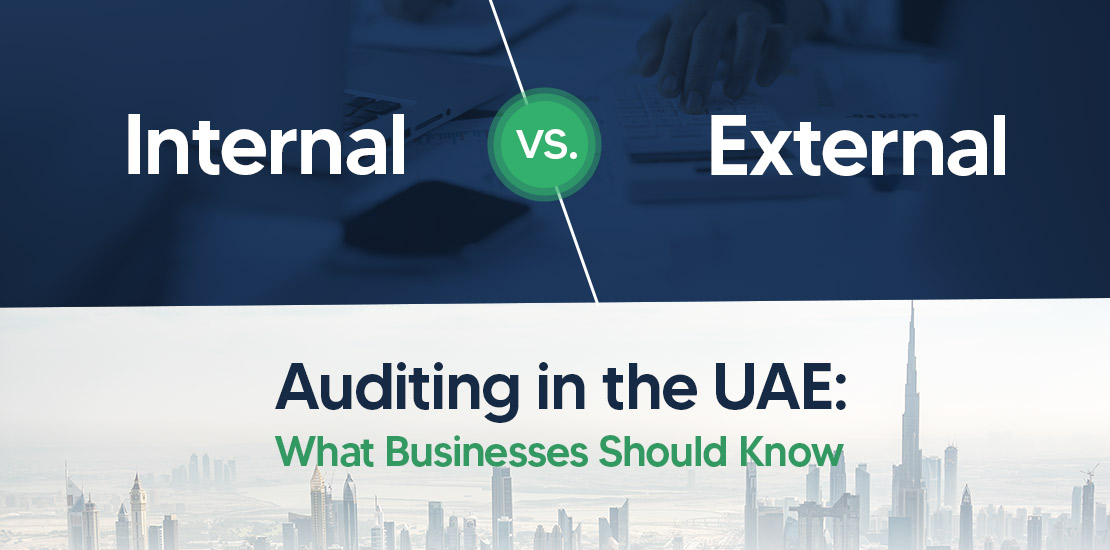Table of Contents
- What is an Audit?
- Key Elements of an Audit
- Types of Audits
- What is Internal Audit in the UAE?
- Key Benefits of Conducting an Internal Audit in the UAE
- Purpose of Internal Audit
- Who needs it?
- Key Standards Followed
- Who performs the internal audit?
- What is an External Audit in the UAE?
- Key Benefits of Conducting an External Audit in the UAE
- Purpose of External Audit
- Who needs an External Audit in the UAE?
- Who Performs the External Audit?
- Internal vs External Auditing: Key Differences
- How to Conduct an Audit Procedure in Dubai
- Internal and External Audit Workflow
- Internal vs External Auditing in the UAE
- Shuraa Tax – Your Trusted Audit Partner in the UAE
- FAQs
Understanding the difference between internal vs external auditing is essential for UAE businesses aiming to maintain financial transparency, comply with regulations, and strengthen their internal controls. While both audit types focus on evaluating financial data and operations, they serve distinct purposes and are conducted by different entities.
Whether you’re a startup, SME, or a large corporation, knowing how internal and external audits function and how they impact your business can help you make informed financial decisions and stay compliant with UAE laws. This blog will discuss the key differences, benefits, and when your company might need each.
What is an Audit?
An audit is a systematic, structured, and independent examination of an organisation’s books, records, operations, or performance. The primary objective is to determine whether the information presented is accurate, reliable, and compliant with applicable laws, standards, and regulations.
Audits can be financial, operational, compliance-based, or even technological, depending on what aspect of the organisation is being reviewed.
Key Elements of an Audit
The key elements of an audit are as follows:
- Independence: Auditors must be impartial and not influenced by those involved in day-to-day operations.
- Evidence-based: Auditors base their opinions on factual evidence (documents, statements, data, etc.).
- Standards: Audits follow specific frameworks, such as the International Standards on Auditing (ISA), GAAS, or local accounting standards.
- Opinion: At the end of the audit, a report includes the auditor’s opinion on the accuracy and fairness of the information.
Types of Audits
Below are the types of audits in the UAE:
1. Financial Audit
- Objective: To verify whether a company’s financial statements (income statement, balance sheet, cash flow, etc.) reflect an accurate and fair view.
- Conducted by: External auditors or statutory auditors.
- Result: An audit report may include opinions like Unqualified (Clean), Qualified, Adverse, or Disclaimer.
2. Internal Audit
- Objective: To evaluate internal controls, governance processes, and risk management.
- Conducted by: In-house audit teams or hired professionals.
- Result: Recommendations for improving internal systems and risk mitigation.
3. External Audit
- Objective: To independently assess an organisation’s financial health and reporting.
- Conducted by: Third-party certified auditors or audit firms.
- Legally required: Yes, especially for public companies, and often for private companies, based on jurisdiction.
4. Tax Audit
- Objective: To ensure accurate tax filing and assess whether tax obligations are met as per law.
- Conducted by: Tax authorities or registered tax auditors.
- Trigger: Often mandatory after a certain income threshold or if red flags are detected.
5. Compliance Audit
- Objective: To ensure the business complies with external laws, industry-specific regulations, or internal policies.
- Common in: Healthcare, banking, manufacturing, etc.
6. Operational Audit
- Objective: To assess the efficiency and effectiveness of operational procedures.
- Focuses on: Workflow, productivity, and use of resources.
7. Information Systems Audit
- Objective: To evaluate IT systems for security, data integrity, and operational efficiency.
- Common in: Tech-driven companies, banks, and government agencies.
What is Internal Audit in the UAE?
In the UAE, internal audit refers to an independent, objective assurance and consulting activity designed to add value and improve an organisation’s operations. It helps companies achieve their objectives by bringing a systematic, disciplined approach to evaluating and enhancing the effectiveness of risk management, control, and governance processes.
Key Benefits of Conducting an Internal Audit in the UAE
Here are the key benefits of Internal Audit in the UAE, especially for businesses operating in a fast-paced and highly regulated environment:
1. Regulatory Compliance
Internal audits ensure that businesses in the UAE comply with local laws such as VAT regulations, Anti-Money Laundering (AML) laws, Economic Substance Regulations (ESR), and the UAE Commercial Companies Law. This helps avoid legal penalties and enhances the company’s credibility with authorities and stakeholders.
2. Improved Financial Accuracy
Internal audits examine financial statements and internal controls to detect errors, prevent fraud, and ensure that economic data is accurate and reliable. This is essential for strategic planning, reporting, and investor confidence.
3. Effective Risk Management
Internal audits identify potential operational, financial, or strategic risks and assess their impact on the business. Auditors then suggest ways to mitigate these risks, helping companies protect their assets and reputation.
4. Enhanced Operational Efficiency
Auditors review internal processes and highlight areas of inefficiency or redundancy. Their recommendations can improve resource allocation, reduce costs, and streamline business operations.
5. Stronger Internal Controls
Internal audits assess the strength and effectiveness of a company’s internal control systems. Strengthening these controls helps reduce the chances of fraud, data breaches, or process failures.
6. Strategic Decision-Making
With accurate insights into business operations and financials, management can make more informed, data-driven decisions that align with the company’s long-term goals.
7. Improved Corporate Governance
Regular internal audits promote transparency, accountability, and ethical conduct within the organisation, building stakeholder trust and supporting sustainable growth.
Purpose of Internal Audit
- Assessing internal controls: Ensures systems and procedures are in place to manage risks effectively.
- Compliance: This check ensures that the organisation follows UAE laws, regulations (such as VAT compliance), and internal policies.
- Risk management: Identifies and evaluates financial, operational, and strategic risks.
- Operational efficiency: Reviews whether resources are being used efficiently and effectively.
Who needs it?
- Listed companies: These must have internal audit functions under the UAE corporate governance rules.
- Large private businesses: Especially those with complex operations or seeking to maintain strong internal governance.
- Free zone and mainland companies: Those subject to sector-specific regulations (finance, healthcare, education, etc.).
Key Standards Followed
- International Standards for the Professional Practice of Internal Auditing (IIA)
- IFRS (for financial audits)
- UAE Commercial Companies Law
Who performs the internal audit?
- In-house internal auditors
- Third-party auditing firms (many companies outsource to firms for an independent view)
What is an External Audit in the UAE?
An external audit is an independent examination of a company’s financial statements and records by a licensed audit firm. The main goal is to ensure that the financial statements are accurate and reliable and comply with applicable laws, such as the UAE Commercial Companies Law and International Financial Reporting Standards (IFRS).
Key Benefits of Conducting an External Audit in the UAE
External audits are essential for businesses aiming to maintain transparency, build stakeholder trust, and ensure compliance with financial and regulatory standards in the UAE.
1. Independent Financial Verification
An external audit provides an unbiased and independent review of a company’s financial statements. This verification assures stakeholders, such as investors, banks, and regulatory bodies, that the financial records are accurate, transparent, and free from material misstatements.
2. Regulatory Compliance
External audits help ensure a business complies with the UAE’s legal and financial reporting standards, including IFRS (International Financial Reporting Standards) and VAT laws. Compliance avoids legal penalties and reinforces the company’s commitment to transparency and accountability.
3. Enhanced Investor and Stakeholder Confidence
A clean audit report from an independent auditor boosts the confidence of shareholders, potential investors, and financial institutions. It shows that the company maintains sound financial practices essential for attracting investments or securing loans.
4. Detection of Fraud and Errors
While the primary goal is not to detect fraud, external audits can uncover anomalies, irregularities, or weaknesses in financial reporting. This helps organisations address issues early and implement stronger internal controls.
5. Improved Financial Transparency
External auditors review and validate all aspects of financial reporting, which increases transparency in how the company manages its finances. This is especially important for publicly traded companies or businesses seeking to grow in the UAE’s competitive market.
6. Objective Recommendations
External auditors often provide valuable insights and suggestions for improving financial and operational processes. Their objective perspective can help businesses implement best practices and achieve greater efficiency.
7. Credibility in the Global Market
Audited financial statements enhance global credibility for international trade or expansion businesses. It helps build trust with foreign partners, clients, and investors, strengthening the company’s position in the worldwide market.
Purpose of External Audit
- Financial accuracy: Verifies the correctness of financial statements.
- Legal compliance: Ensures the business complies with UAE laws, including VAT and economic substance regulations (ESR).
- Investor/Stakeholder trust: Builds credibility and transparency with shareholders, banks, and government authorities.
- Annual license renewal: Many free zones and mainland authorities require audit reports for trade license renewals.
Who needs an External Audit in the UAE?
- Mainland companies (as per the UAE Commercial Companies Law)
- Free zone companies (especially in DMCC, DAFZA, JAFZA, etc.)
- Financial institutions, insurance companies, and public interest entities (mandatory by regulation)
- Companies with ESR or UBO filing requirements
Standards Followed
- IFRS (International Financial Reporting Standards)
- UAE Federal Law No. 2 of 2015 (as amended)
- Auditing standards issued by the UAE Ministry of Economy
Who Performs the External Audit?
Only approved audit firms licensed by the UAE Ministry of Economy or registered with specific free zone authorities.
The auditor must be independent from the company being audited.
Internal vs External Auditing: Key Differences
Understanding the difference between internal and external audit is crucial for any business aiming to maintain transparency and compliance. Let’s differentiate between internal audit and external audit based on several key factors:
| Factor | Internal Audit | External Audit |
|---|---|---|
| Objective | To evaluate and improve the effectiveness of internal controls, risk management, and governance processes. | To provide an independent opinion on the truth and fairness of the financial statements. |
| Conducted By | The company’s employees or an internal audit team. | Independent third-party auditors or external auditing firms. |
| Reporting To | Management and the board of directors. | Shareholders, investors, and regulatory authorities. |
| Frequency | Conducted regularly throughout the year. | Usually conducted annually. |
| Scope | It is not mandatory but highly recommended for internal control. | Legally required for certain types of organisations. |
| Regulatory Requirement | It is not mandatory but highly recommended for internal control. | Legally required for certain types of organisations. |
| Independence | Less independent, since they are part of the organisation. | Completely independent of the organisation being audited. |
In summary, comparing internal and external audits shows that internal auditing is a continuous process focused on internal improvements. In contrast, external auditing is a formal, regulatory process focused on verifying financial accuracy.
How to Conduct an Audit Procedure in Dubai
Auditing in Dubai follows a structured process to ensure accuracy, compliance, and transparency. Here’s a step-by-step breakdown of how a standard audit is carried out:
1. Developing an Audit Plan
The process begins with a detailed audit plan that outlines the scope, timeline, objectives, and required resources for the audit.
2. Establishing Client Relationship
Building rapport and clear communication with the client is key. This helps auditors understand the client’s business environment and ensures smooth collaboration.
3. Executing Control Testing
Auditors assess internal controls to identify potential risks and verify the accuracy of financial records and processes.
4. Reviewing and Drafting Reports
Based on the findings, a draft report is prepared, highlighting any discrepancies, non-compliance, or recommendations for improvement.
5. Issuing the Final Audit Report
The final audit report is issued after client review and any necessary revisions. It offers a transparent and professional assessment of the organisation’s financial health.
Internal and External Audit Workflow
An audit is more than an inspection—it’s a structured process that ensures transparency, accountability, and continuous improvement across operations.
Strategy Design
Every audit begins with a strategy session between the auditor and the client. This meeting sets the foundation, defining scope, identifying potential risks, and outlining audit objectives. All necessary documents and data are compiled during this phase to streamline the process.
Client Engagement and Trust Building
A solid rapport with the client is essential. The audit team introduces their methodology during the initial phase and outlines key focus areas. This transparency fosters mutual trust and encourages smoother cooperation throughout the audit.
Operational Snapshot & Data Collection
Surveys or questionnaires provide a broad operational overview. This step allows auditors to understand the system environment and collect further insights by interacting with personnel in key roles.
On-Site Evaluation & Sample Testing
With a plan in place, auditors move into execution, reviewing processes on-site and conducting transaction tests. This hands-on verification ensures the gathered data is accurate and the systems function as intended.
Insight Compilation & Draft Report
Findings from the audit are consolidated into a detailed draft report. This includes expert recommendations, observed issues, and opportunities for improvement. The draft is shared with the client for feedback and possible revisions.
Closure & Follow-Up
The final report is prepared and submitted after the review. A follow-up phase may be initiated to revisit unresolved concerns or verify action on earlier suggestions. Persistent issues can be included in future audits or reported to governance bodies.
Internal vs External Auditing in the UAE
Understanding the difference between internal and external audit is vital for maintaining transparency, enhancing governance, and ensuring compliance in the UAE. While internal audits evaluate risk management, controls, and operational efficiency, external audits independently verify financial accuracy and legal adherence.
Whether you’re looking to improve internal systems or meet regulatory requirements, differentiating between internal and external audits helps you make smarter financial decisions and build stakeholder trust.
If you’re unsure when your business needs either or both, Shuraa Tax is here to help. Our experts offer customised advice and audit support to keep your company compliant and efficient.
Shuraa Tax – Your Trusted Audit Partner in the UAE
📞 Call: +(971) 44081900
💬 WhatsApp: +(971) 508912062
📧 Email: info@shuraatax.com
Let us simplify internal vs external auditing for your business today.
FAQs
Q1. How does an internal audit differ from an external audit?
An internal audit is conducted by a company’s internal team to evaluate risk management, internal controls, and operational efficiency. An external audit, on the other hand, is performed by an independent auditor to verify the accuracy of financial statements for regulatory and stakeholder purposes.
Q2. What is the difference between internal and external audit in the UAE?
In the UAE, internal audits focus more on improving the organisation’s internal processes and risk management. External audits are mandatory for most companies and ensure compliance with UAE commercial laws, particularly for free zone and mainland companies.
Q3. Which is more important, internal audits vs external audits?
Both audits serve different purposes. Internal audits help with day-to-day risk mitigation and operational improvements. External audits are legally required to maintain financial transparency and compliance, especially with government authorities in the UAE.
Q4. Internal audit versus external audit: who conducts them?
Employees or an in-house audit department usually carry out internal audits. Independent, third-party auditors or licensed audit firms conduct external audits.
Q5. Is external audit mandatory in the UAE?
Yes, external audits are mandatory for most businesses in the UAE, particularly those registered in the mainland or free zones. Authorities often require the submission of audited financial statements annually.
Q6. Do UAE companies need to conduct internal audits?
While not always mandatory, many UAE companies conduct internal audits to strengthen internal controls, enhance risk management, and ensure compliance with company policies and regulations.
Q7. How often should internal audits be conducted compared to external audits in the UAE?
Internal audits can be conducted quarterly or as needed, depending on the organisation’s risk profile. External audits are generally performed annually, as UAE law and regulatory bodies require.
Q8. Can the same firm handle internal and external audits in the UAE?
Separating internal and external audit functions is generally recommended to avoid conflicts of interest and ensure independence, especially for external audits.













